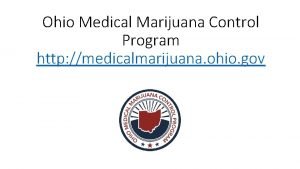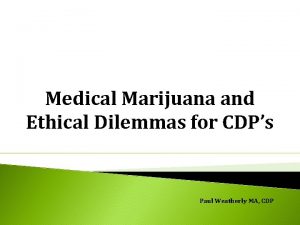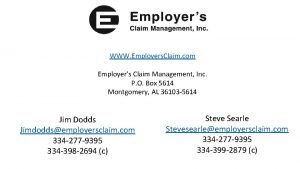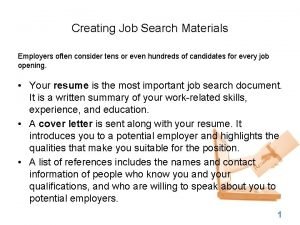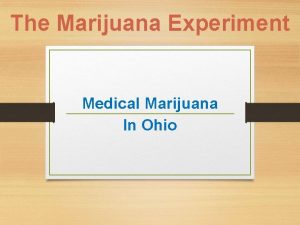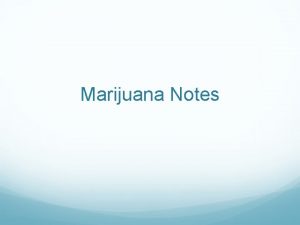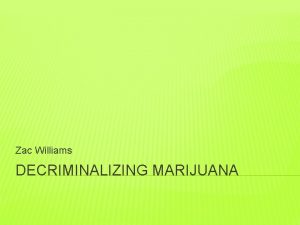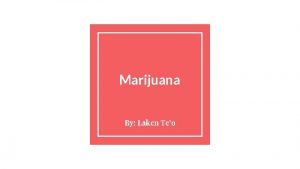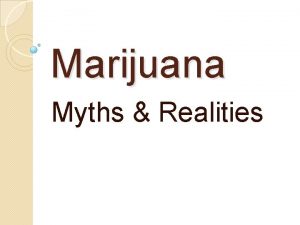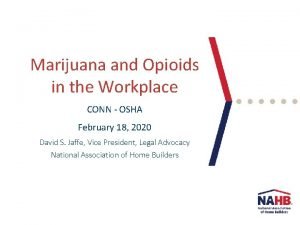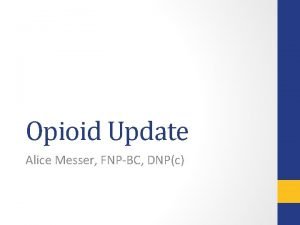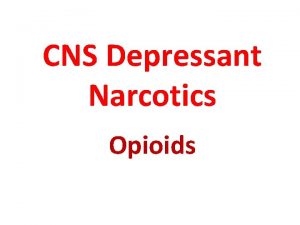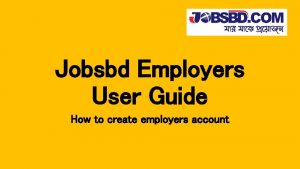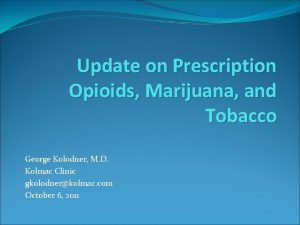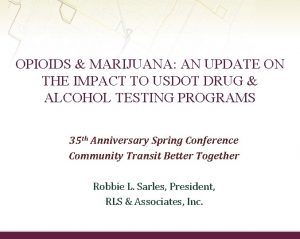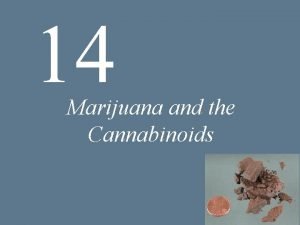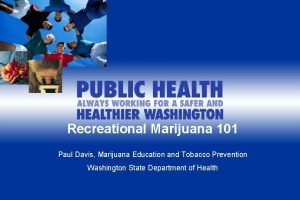Opioids Marijuana and the Workplace An Employers Guide




























- Slides: 28

Opioids, Marijuana, and the Workplace: An Employer's Guide Emmanuel Boulukos ICE MILLER LLP Phone: (317) 236 -2233 emmanuel. boulukos@icemiller. com www. icemiller. com

Road Map Current Trends Federal Law Considerations State Law Considerations Policy Considerations icemiller. com

Current Trends 14. 8 million Americans abuse drugs – seventy percent of them (10. 4 mil) are currently employed 69% of illicit drug users have used at work Employees who abuse prescription drugs are 2 -5 times more likely to take unexcused absences, be late for work, be injured or violent at work, file workers' compensation claims, and quit or be fired within one year of employment 10 -20% of American workers who die at work have a positive result when tested for drugs or alcohol icemiller. com

Opioids Opioid Crisis • Opioids are powerful and highly addictive prescription painkillers; prescribed to treat serious health conditions (ex. Cancer) • Addiction often begins with lawfully prescribed medication • According to a 2019 report published by the Indiana State Department of Health, there were more than 1, 800 drug overdose deaths in Indiana during 2017, the 14 th highest rate in the U. S. • Impacts hiring, turnover, benefit costs, safety, and productivity icemiller. com

Current Trends icemiller. com

Current Trends icemiller. com

Current Trends States Permitting the Use of Marijuana (medical and/or Recreational) Washington – Recreational Nevada – Recreational California – Recreational Colorado – Recreational Ohio – Medical Illinois - Recreational Michigan – Recreational And many more!! icemiller. com

Americans with Disabilities Act The ADA permits employers to ensure workplace is free from illegal use of drugs and alcohol But must do so within framework of protection of qualified persons with disabilities May prohibit the illegal use of drugs and alcohol at work May require employees not be under the influence of alcohol or engaged in the illegal use of drugs May hold employees engaged in illegal use of drugs and alcoholics to same performance and behavioral standards as other employees, May test for illegal use of drugs May test for alcohol (but some limitations) icemiller. com

Americans with Disabilities Act Prohibits discrimination against qualified individuals with disabilities Qualified = can perform essential job functions with or without a reasonable accommodation Requires employers to provide reasonable accommodations to qualified individuals Places limits on disability-related inquiries and medical examinations Protects confidentiality of medical information icemiller. com

Americans with Disabilities Act Disability? Physical or mental impairment that substantially limits one or more major life activities Record of such an impairment Regarded as having such an impairment Disability may include alcoholism or substance addiction if major life activities affected Does not include an employee or applicant currently engaging in the illegal use of drugs, when acting on the basis of such use But would include rehabilitated user or someone regarded, erroneously, as addict icemiller. com

Americans with Disabilities Act Pre-offer: You cannot ask questions at the pre-offer stage that are likely to elicit information about a disability. Why? Post-offer: You may ask disability-related questions and require the person to submit to a medical evaluation as long as all persons in the job category are required to do so. • It must be the only item left to complete in the hiring process • The medical evaluation does not need to be limited to job-related concerns • However, if the person is denied employment, the reason must be jobrelated and consistent with business necessity icemiller. com

Americans with Disabilities Act Prescription Drugs Can prohibit/test for illegal use or abuse Cannot prohibit all use or require employees to report all prescriptions taken • Must make individualized assessment regarding safety or risk of harm to self or others as job-related and consistent with business necessity icemiller. com

Americans with Disabilities Act Performance/Behavior Standards • May require alcoholic or illegal drug user to meet same performance/behavior standards and discipline/terminate • May suggest employee who has engaged in misconduct due to alcoholism or illegal drug use to go to EAP, discipline or both • If employee mentions addiction or requests accommodation in response to discipline, may still discipline, but may be required to engage in interactive process of accommodation for alcoholism (i. e. , leave for treatment) Do not have to rescind discipline or grant an accommodation that supports drinking, such as modified work schedule to allow for tardiness icemiller. com

Americans with Disabilities Act Possible accommodations for addiction issues: • All dependent on the “interactive process” A discussion about the essential functions of the job, the employee’s issues, and possible accommodations that will allow employee to perform essential job functions May start with, “Is there anything that we can do to help you do your job/meet expectations? ” • Leave for treatment/counseling • Transfer to an alternative position • Modifications to schedule or assignments icemiller. com

Americans with Disabilities Act Last Chance Agreements Employer may choose, but is not required, to offer last chance agreement No termination in exchange for substance abuse treatment Refrain from further alcohol or drug use Avoid further workplace problems Confidentiality • Drug testing and disability-related information must be kept confidential icemiller. com

Family and Medical Leave Act Treatment for substance abuse may be a serious health condition if the conditions for inpatient care and/or continuing treatment are met FMLA leave may only be taken for substance abuse treatment provided by a health care provider or by a provider of health care services on referral by a health care provider Absence because of the employee's use of the substance, rather than for treatment, does not qualify for FMLA leave The employer may not take action against the employee because the employee has exercised his or her right to take FMLA leave for substance abuse treatment An employee may also take FMLA leave to care for a covered family member who is receiving treatment for substance abuse icemiller. com

Controlled Substances Act • Classifies marijuana as a Schedule 1 drug • Considers marijuana a drug that has a high potential for abuse with no accepted medical use. icemiller. com

National Labor Relations Act Unionized workplaces: • Drug and alcohol policies are a term or condition of employment and therefore a “mandatory subject of bargaining” • Cannot implement policy or make unilateral changes without bargaining • In some contracts, management rights clause or specific language allows employer to implement and or make changes to policy without further bargaining, usually subject to “reasonableness” challenge icemiller. com

State Law Legalization State Law Protections – Must employers accommodate medical marijuana use? State-by-State Determination For example, OH has limited protections: Ohio Revised Code Section 3796. 28 - employers are under no obligation to accommodate an employee's use, possession or distribution of medical marijuana Not prohibited from taking adverse employment actions because of an employee's use of medical marijuana. icemiller. com

State Law Legalization Employee in Michigan terminated after testing positive for medical marijuana Employee’s use was legal under state law. Claimed he was never under influence at work. Sixth Circuit - Michigan's medical marijuana statute "does not regulate private employment; [r]ather the Act provides a potential defense to criminal prosecution or other adverse action by the state. " icemiller. com

State Law Legalization Expanded Protections • Minn. Stat. Ann. § 152. 32 Prohibits employers from discriminating against employees who are registered in medical marijuana program. Barbuto v. Advantage Sales & Mktg. • Employee terminated after testing positive for marijuana • Alleged she could do job with accommodation of waiving drug test • Employer argued accommodation per se unreasonable icemiller. com

State Law Legalization Court held: • If medical marijuana is most effective medication, permitting use is facially reasonable accommodation • "to declare an accommodation for medical marijuana to be per se unreasonable out of respect for Federal law would not be respective of the recognition of the Massachusetts voters, shared by the legislatures or voters in the vast majority of states, that marijuana has an accepted medical use for some patients[. ]" icemiller. com

CBD Oil What is it? • • Cannabis plant extract with purported medicinal benefits • No intoxicating properties • Used to treat numerous different health problems, (including chronic pain, mental illness, and cancer related symptoms) Legal Status: • Federally legal when derived from hemp (cannabis with less than 0. 3% concentration of THC) Challenges: • Employees blame positive tests on lawful use • Production sufficiently regulated to ensure quality/safety? icemiller. com

Drug/Alcohol Policy Considerations Federal Law Considerations: • Does not limit drug testing by private employers Public employees subject to constitutional protections • Special treatment for alcohol testing under ADA • Mandatory testing for employees in certain safety sensitive jobs (drivers, pilots etc. ) Requirements for federal contractors? • ADA and FMLA (non-discrimination against recovering addicts, accommodations, and leave) • NLRA bargaining obligation in unionized environments icemiller. com

Drug/Alcohol Policy Considerations State Law Considerations: • Multi-state employers may need state-specific policies Notification requirements Differential protections for med marijuana • Note: Even in states where medical marijuana is protected, employers may implement policies that prohibit the possession of drugs on employer property and also prohibit employees from being under the influence at the workplace Testing for intoxication? icemiller. com

Drug/Alcohol Policy Considerations Key Policy Components: • Define prohibited conduct based on safety, business need, and legal requirements Differentiate between alcohol / drug if random testing Differentiate by employee class where appropriate Substances tested State-specific limits • Circumstances under which testing will occur and procedure Post-offer, random, reasonable suspicion Testing site, method, transportation icemiller. com

Drug/Alcohol Policy Considerations • Consequence of Positive Tests Definition of positive test should address refusal and/or inability to produce testable sample, and positive result based on lawful use of RX Disciplinary consequences of failed test Consistent (non-discriminatory) Fits needs and concerns of particular workplace Takes into consideration other relevant conduct policies Circumstances under which last chance agreements / second chances will be allowed (if any): • First offense? • Self-disclosure before test? icemiller. com

Questions? Thank you! icemiller. com
 Opioids for neuropathic pain
Opioids for neuropathic pain Brown weeds
Brown weeds Medicalmarijauna ohio gov
Medicalmarijauna ohio gov Became marijuana state
Became marijuana state Should marijuana be a medical option
Should marijuana be a medical option Lungs marijuana
Lungs marijuana Halucinogens
Halucinogens Medical marijuana ethics
Medical marijuana ethics Employers claim management
Employers claim management Interview techniques for employers
Interview techniques for employers Employers must not place construction loads
Employers must not place construction loads Handles on these must not extend beyond
Handles on these must not extend beyond Hemic hawaii
Hemic hawaii Skills desired by employers
Skills desired by employers Communication and employability
Communication and employability Federation of european social employers
Federation of european social employers It is acceptable to ride concrete buckets
It is acceptable to ride concrete buckets Employers right
Employers right Disadvantage of using a safe deposit box
Disadvantage of using a safe deposit box Explain why employers often
Explain why employers often Hình ảnh bộ gõ cơ thể búng tay
Hình ảnh bộ gõ cơ thể búng tay Slidetodoc
Slidetodoc Bổ thể
Bổ thể Tỉ lệ cơ thể trẻ em
Tỉ lệ cơ thể trẻ em Voi kéo gỗ như thế nào
Voi kéo gỗ như thế nào Tư thế worm breton là gì
Tư thế worm breton là gì Chúa yêu trần thế alleluia
Chúa yêu trần thế alleluia Các môn thể thao bắt đầu bằng tiếng nhảy
Các môn thể thao bắt đầu bằng tiếng nhảy Thế nào là hệ số cao nhất
Thế nào là hệ số cao nhất


